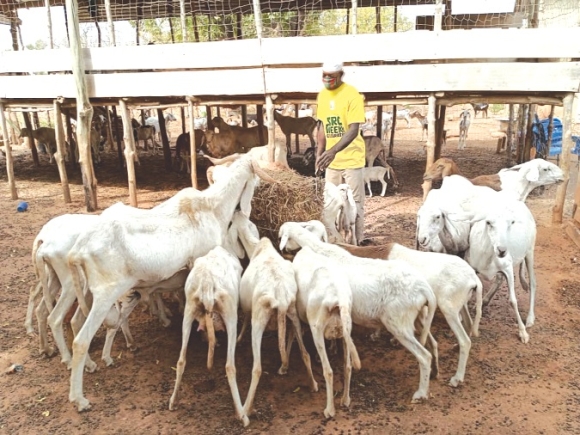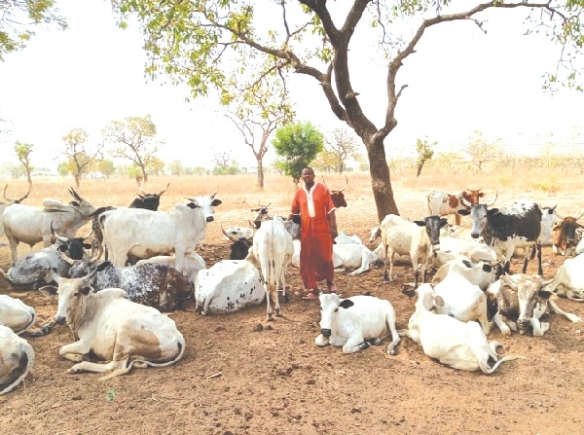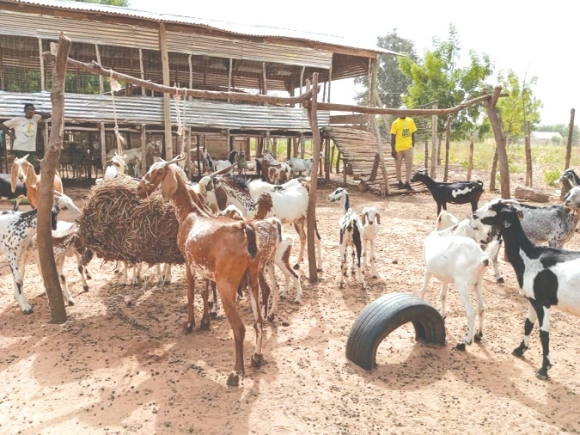
Dry Season: A challenging period for livestock farmers in the North
The dry season has been a challenging period for livestock farmers in Northern Ghana each year.
The period lasts from November to April and is often characterised by high temperatures, low humidity and lack of rainfall, which significantly impact the availability and quality of animal feed.
This is because the once-lush grazing pastures wither away, leaving behind a desolate landscape of dust, wind and cracked earth.
Beyond that, waterbodies such as streams, ponds and dugouts which serve as the source of drinking water for the animals dry up.
This season is no exception as many livestock farmers are facing the same challenge, which is threatening their livelihoods and the sustainability of their farming practices.
 Issahaku Musah, livestock farmer inspecting his animals
Issahaku Musah, livestock farmer inspecting his animals
Current situation
Checks by the Daily Graphic indicated that large tracts of pastures dotted across the region, where livestock such as cattle, sheep and goats used to feed, were dried up and destroyed by wildfires.
Similarly, the intense dry spell has also caused the disappearance of the few existing water bodies.
Even intensive system farmers who used these grazing pastures to prepare fodder for their livestock were bearing the same brunt.
The situation is making it difficult for animals to find nutritious feeds, resulting in weight loss, malnutrition and reduced productivity.
According to the Ghana Statistical Service (GSS), livestock accounts for approximately 14 per cent of agricultural Gross Domestic Product (GDP) in Ghana, with the majority coming from the Northern regions.
Despite this contribution, the challenges faced by farmers during the dry season threaten the sector's sustainability.
A study by the Ministry of Food and Agriculture (MoFA) in 2023 revealed that 65 per cent of grazing lands in Northern Ghana become barren during the dry season, leaving animals with insufficient forage.
This compels farmers to travel an average of 15-20 kilometres daily in search of grazing lands, according to the Savannah Agricultural Research Institute (SARI).
 Some livestock being fed with forage
Some livestock being fed with forage
Concerns
Interacting with the Daily Graphic, a livestock farmer, Issahaku Musah, bemoaned the impact of the season on his farm, saying that he invests less in the rainy season feeding than in the dry season.
"Last year, I lost about 20 sheep during the dry season to insufficient feed and water. I was stranded and didn’t know what to do,” he said.
Another farmer, Zakaria Yaw, indicated that he often travels far distances in search of water for his cattle to drink, saying “The dam that the cattle is going to drink is also a source of water for community members, so there is always a problem whenever we take our animals there."
He said many farmers lack the knowledge to prepare feeds during the rainy season and stock for the dry season.
Appeal
In an interview with the Daily Graphic, a Veterinary Officer, Abubakari Salifu, said many livestock farmers do not have the technical know-how to prepare fodder to feed their animals.
"There are some farmers who have been to veterinary colleges and cannot even prepare feeds for their animals, so this is a technical challenge facing livestock farmers in the region," he said.
Aside from the feed, he said the dry season often triggers several livestock sicknesses, which easily lead to death if not given the needed attention.
He emphasised the need to train livestock farmers on how to prepare silage or animal feeds for their livestock to help mitigate the impact of the dry spell on their farms.
Unyielding efforts
In 2019, the government, through the "Planting for Food and Jobs" programme, introduced fodder cultivation initiatives to ensure year-round feed availability. However, there is no accurate data on the number of farmers who have benefited from such an initiative.
Also, the construction of dugouts under the One Village, One Dam initiative was set to, among other things, help provide a source of drinking water for livestock. However, it appears the dams were unable to serve this purpose, as they often dry up during the season.
Way forward
The dry season remains a challenging period for livestock farmers in Northern Ghana, with far-reaching economic, environmental and social implications.
There is, therefore, the need for targeted interventions, increased government support and sustainable farming practices to help alleviate these challenges.
Also, livestock farmers should be introduced and trained on how to prepare fodder and stock for their animals during the dry season.
Writer’s email:
